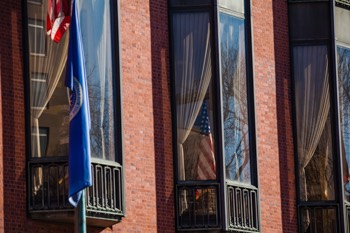 Drone Technologies, Inc. v. Parrot S.A., (Fed. Cir. Sept. 29, 2016) (Before Newman, Schall, and Chen, J.) (Opinion for the court, Schall, J.) (Concurring opinion, Newman, J.)
Drone Technologies, Inc. v. Parrot S.A., (Fed. Cir. Sept. 29, 2016) (Before Newman, Schall, and Chen, J.) (Opinion for the court, Schall, J.) (Concurring opinion, Newman, J.)
Drone sued Parrot for indirect infringement of two patents relating to remote-controlled drones. Parrot moved to dismiss for lack of standing, alleging that the inventorship of Drone’s patent was incorrect, rendering the assignment to Drone invalid. The district court denied Parrot’s motion. Additionally, the parties disputed whether Parrot must produce all source code used in operating its drone models. Drone filed two motions to compel, which the district court granted despite adamant push-back from Parrot. The district court ultimately sanctioned Parrot for failing to produce all of the relevant documents, and entered a default judgment on the Complaint.
Parrot appealed, challenging: 1) the district court’s denial of Parrot’s motion to dismiss for lack of standing; 2) whether the district court abused its discretion in compelling Parrot to turn over its on-board source code and entering a default judgment; and 3) whether damages were wrongfully awarded. Because the Court vacated the default judgment, it did not address the third issue.
On the first issue, the Court affirmed the district court’s denial of Parrot’s motion to dismiss for lack of standing. The parties disputed whether the Court must substantively consider inventorship when assessing standing. Parrot asserted Drone lacked standing because the sole inventor of Drone’s patents did not conceive the entire invention and therefore the assignment to Drone was inadequate. Drone countered that inventorship is presumed to be correct when assessing standing to sue.
The Court sided with Drone and refused to substantively examine inventorship, where Drone’s claim to title was not otherwise in dispute. Inventorship of an issued patent is presumed correct, and Parrot provided no persuasive reason why the Court must litigate inventorship as part of the standing analysis. Alternatively, Parrot may challenge inventorship as an invalidity defense, but doing so under the guise of standing is improper.
On the second issue, the Court vacated the default judgment, finding that the district court abused its discretion by first compelling Parrot to turn over all of its on-board source code and second in determining that a default judgment for non-compliance was appropriate. Following Third Circuit precedent, the Court found that the district court’s decisions on production inexplicably deviated from local rules governing discovery. The Court also found that the district court abused its discretion by determining that a default judgment was an appropriate sanction because precedent suggested an opposite outcome, particularly in light of the “strong presumption” that exists against sanctions that decide the issues of a case.
In a concurring opinion, Judge Newman agreed to the remand, but challenged the panel’s finding that a substantive examination of inventorship is unnecessary when determining standing. She would have the district court consider inventorship, because it affects ownership, not just validity, and ownership is critical to determining if the plaintiff has standing to sue on the patent.
Inventorship is presumed correct even when considering standing to sue.
[Troutman-Ad]
[Troutman-About]

![[IPWatchdog Logo]](https://ipwatchdog.com/wp-content/themes/IPWatchdog%20-%202023/assets/images/temp/logo-small@2x.png)


![[Advertisement]](https://ipwatchdog.com/wp-content/uploads/2024/04/Artificial-Intelligence-2024-REPLAY-sidebar-700x500-corrected.jpg)
![[Advertisement]](https://ipwatchdog.com/wp-content/uploads/2024/04/UnitedLex-May-2-2024-sidebar-700x500-1.jpg)
![[Advertisement]](https://ipwatchdog.com/wp-content/uploads/2024/04/Patent-Litigation-Masters-2024-sidebar-700x500-1.jpg)

![[Advertisement]](https://ipwatchdog.com/wp-content/uploads/2021/12/WEBINAR-336-x-280-px.png)
![[Advertisement]](https://ipwatchdog.com/wp-content/uploads/2021/12/2021-Patent-Practice-on-Demand-recorded-Feb-2021-336-x-280.jpg)
![[Advertisement]](https://ipwatchdog.com/wp-content/uploads/2021/12/Ad-4-The-Invent-Patent-System™.png)






Join the Discussion
No comments yet.